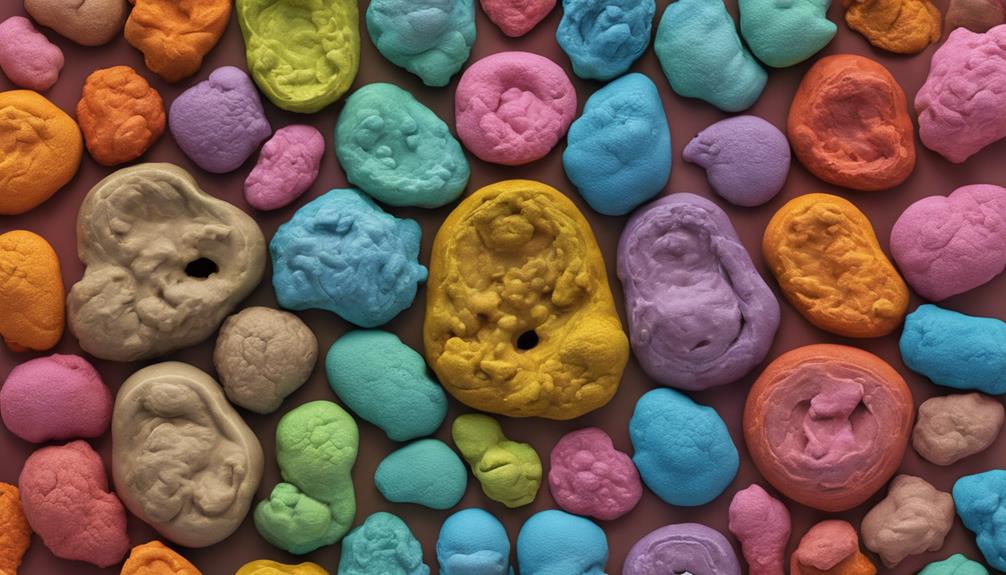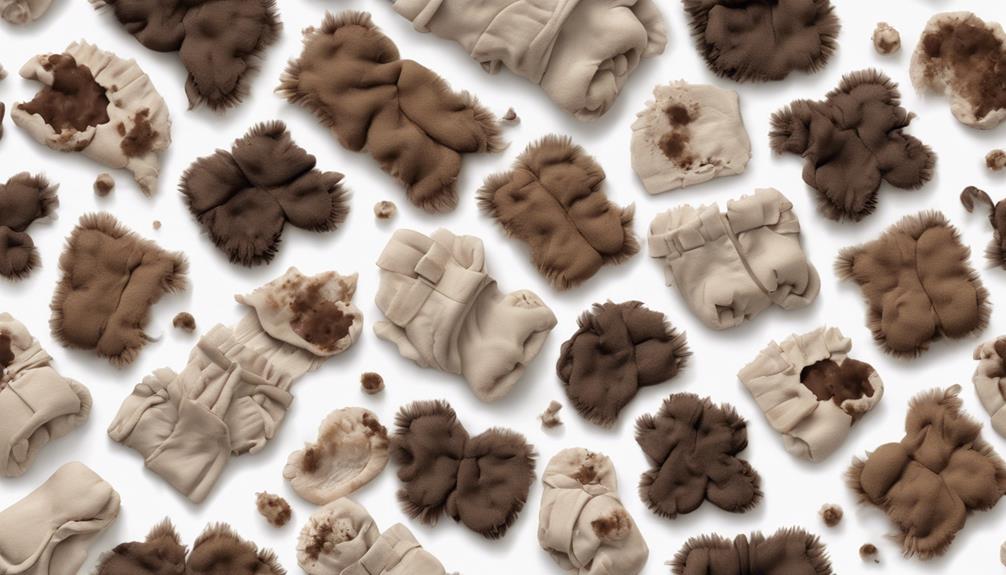As new parents, we were puzzled when our newborn started having loose, watery stools more frequently. It's important to understand the distinction between normal bowel movements and diarrhea in infants to prevent potential health risks.
By being able to identify the signs of diarrhea early on, caregivers can take appropriate action to safeguard their baby's well-being. Let's explore why this differentiation is important for newborn care and what red flags to watch out for when it comes to infant bowel movements.
Key Takeaways
- Monitoring health and nutrition
- Early detection of issues
- Distinguishing normal stool characteristics
- Prompt medical attention for diarrhea
Importance of Recognizing Newborn Bowel Movements
Recognizing newborn bowel movements is pivotal for accurately monitoring the health and nutritional intake of the baby. Normal stools provide valuable insights into the baby's digestive system functioning. Inconsistencies in bowel movements, such as diarrhea, can be early signs of dehydration or underlying digestive problems. By paying close attention to the baby's stools, caregivers can detect abnormalities promptly and take necessary actions to address any issues that may arise.
Diarrhea in newborns is a concern as it can lead to dehydration, indicated by symptoms like decreased urine output, dry mouth, or lethargy. Monitoring the frequency and consistency of bowel movements is essential to differentiate between normal and abnormal stools. Diaper rash, often associated with diarrhea, can also be a warning sign of digestive disturbances. Understanding these nuances allows caregivers to provide appropriate care and seek medical advice if needed. Overall, being attuned to the baby's bowel movements is fundamental for ensuring their well-being and preventing potential complications.
Differentiating Normal Stools From Diarrhea
Differentiating normal stools from diarrhea in newborns requires keen observation of specific characteristics in their bowel movements. Normal newborn poop, especially in breastfed babies, is typically soft, yellowish, and may contain small curds. On the other hand, diarrhea in newborns presents as loose, watery stools that are more frequent and may have a foul smell. It is essential to note that diarrhea can lead to dehydration in babies if not addressed promptly. Additionally, diarrhea in newborns may also contain mucus or blood, indicating an underlying issue that requires medical attention. Understanding these distinctions is vital for caregivers as it helps in evaluating the baby's health and hydration status accurately.
| Characteristic | Normal Stools in Newborns | Diarrhea in Newborns |
|---|---|---|
| Consistency | Soft, yellowish, small curds | Loose, watery |
| Frequency | Variable | More frequent |
| Color | Yellowish | Can be different |
| Odor | Mild | Foul smell |
Signs of Newborn Diarrhea
Moving from distinguishing normal stools to identifying signs of newborn diarrhea involves recognizing specific indicators in their stool frequency and consistency. Newborn diarrhea is characterized by frequent watery stools, usually more than three per day. These stools may have a foul smell, appear green, or contain mucus.
It's important to monitor for signs of dehydration, such as decreased urine output, a dry mouth, or a sunken fontanelle. If you notice these symptoms, it's vital to seek healthcare provider consultation promptly. Failure to address newborn diarrhea promptly can lead to complications like dehydration, which can be dangerous for their health.
Impact of Untreated Diarrhea in Newborns
Untreated diarrhea in newborns poses a severe risk of dehydration, potentially leading to dangerous electrolyte imbalances and critical complications.
The impact of untreated diarrhea in newborns includes:
- Dehydration: Newborns have limited fluid reserves, making them more susceptible to dehydration from diarrhea.
- Electrolyte Imbalances: Untreated diarrhea can disrupt the balance of essential electrolytes in the body, affecting vital functions.
- Complications: Neglected diarrhea in newborns can escalate to severe complications like kidney damage and shock, posing significant health risks.
Failure to recognize and address diarrhea promptly can result in the worsening of these conditions.
Timely medical intervention and appropriate treatment are essential to prevent dehydration-related complications and maintain proper hydration levels in newborns.
It's important for caregivers to be vigilant in identifying signs of diarrhea in newborns and seek medical assistance promptly to mitigate the potential risks associated with untreated diarrhea.
Seeking Medical Help for Newborn Diarrhea
Recognizing the signs of newborn diarrhea is essential for parents to promptly seek medical assistance and guarantee the well-being of their infant. If your baby is 3 months or younger and experiencing diarrhea, it is crucial to monitor their symptoms closely. Contact a doctor if the newborn has a rectal temperature of 100.4°F (38°C) or higher, as this could indicate a more serious condition. Immediate medical attention is needed if the newborn is vomiting or lacks energy, as these could be signs of dehydration. Look for other signs of dehydration like dry mouth or no urine output for 3 or more hours in newborns with diarrhea. Babies with diarrhea and fever should be monitored closely and seen by a pediatrician promptly to prevent dehydration.
| Signs of Dehydration | Need for Immediate Medical Attention |
|---|---|
| Dry mouth | Vomiting |
| No urine output for 3+ hours | Lack of energy |
| High rectal temperature |
Frequently Asked Questions
How Do You Tell the Difference Between Diarrhea and Normal Poop in Newborns?
We distinguish diarrhea from normal newborn poop by noting watery, frequent stools with mucus or blood for diarrhea. Normal poop is soft, yellow, or seedy for breastfed babies; firmer, tan to brown for formula-fed. Observing changes helps identify issues.
What Is the Difference Between Normal Feces and Diarrhoea Feces?
Differentiating normal feces from diarrhea in newborns is important. Normal poop is soft, yellowish, and seedy, while diarrhea is watery with a foul smell. Monitoring these differences helps guarantee a healthy digestive system and prompt medical attention when needed.
What Is the Difference Between Normal and Abnormal Baby Poop?
Differentiating normal vs. abnormal baby poop is essential. Normal poop is soft, yellowish, with small curds for breastfed babies. Abnormal, like diarrhea, is watery, foul-smelling. Look for blood, mucus, or consistency changes. Knowing these signs helps us monitor health effectively.
What Do I Need to Know About Newborn Poop?
Newborn poop characteristics vary based on feeding method. Breastfed babies have seedy poop, while formula-fed infants produce thicker stools. Recognizing normal poop aids in evaluating digestion. Differentiating normal from diarrhea is essential for monitoring newborn health.
Conclusion
To sum up, distinguishing between normal newborn bowel movements and diarrhea is like traversing through a delicate ecosystem, where the slightest imbalance can disrupt the fragile equilibrium of a baby's health.
By recognizing the subtle signs and seeking timely medical intervention for diarrhea in newborns, caregivers can guarantee the smooth sailing of their little one's digestive journey towards a healthy and thriving future.









